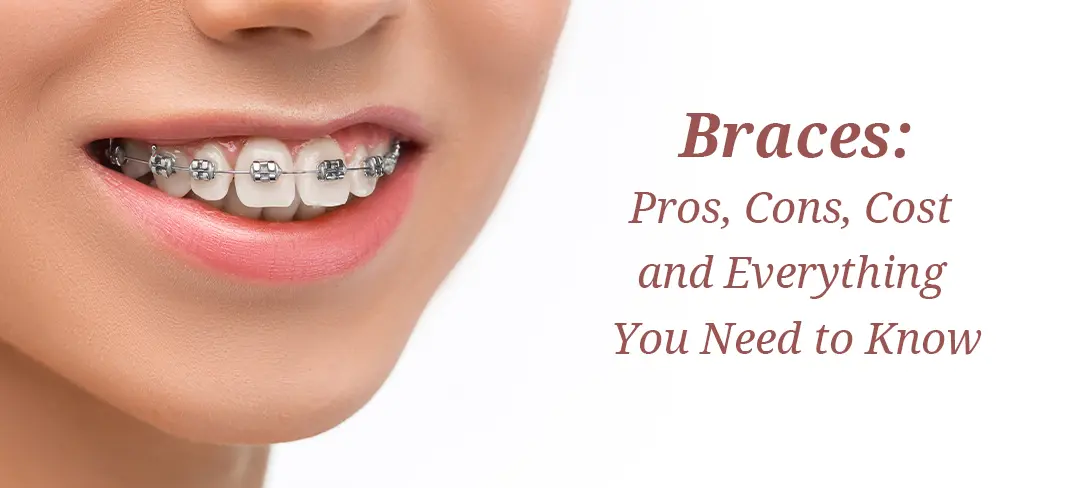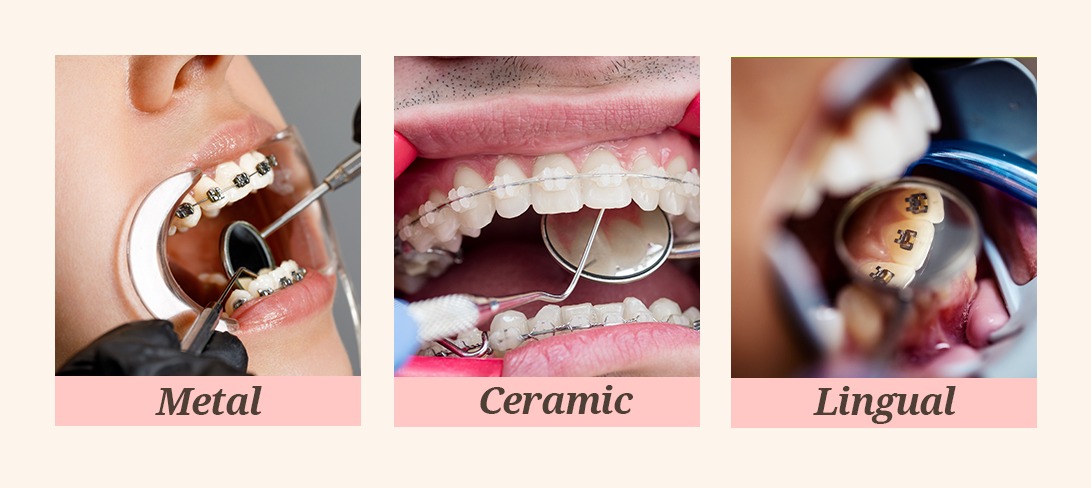
What are the advantages and disadvantages of Braces
Hello! Are you weary of concealing your smile in pictures or feeling uneasy about uneven teeth? You’re not the only one—millions of Indians experience dental alignment problems.
However, there’s a positive twist: braces are no longer exclusively for children!
Braces are a common orthodontic treatment that can work wonders for your teeth, but they come with their own set of challenges. This guide will walk you through the advantages and disadvantages of braces, helping you make an informed decision about your dental journey.
What Are Braces?
Braces are orthodontic devices used to correct misaligned teeth and bite issues. They apply continuous pressure over time to gradually shift teeth into their ideal positions.
Types of Braces
- Metal Braces: Traditional and durable, ideal for all ages.
- Ceramic Braces: Less noticeable; ceramic brackets tend to blend better with teeth.
- Lingual Braces: Hidden behind the teeth, offering discreet treatment.

| Feature | Metal Braces | Ceramic Braces | Lingual Braces |
|---|---|---|---|
| Appearance | Noticeable, traditional metal | Less noticeable, blend with teeth | Hidden behind teeth, discreet |
| Durability | Very durable | Less durable than metal | Durable but difficult to clean |
| Cost | Most affordable | Relatively expensive | Higher cost than that of conventional metal braces |
| Treatment Duration | 1-3 years | 1-3 years | 1-3 years |
| Maintenance | Brushing, flossing & interdental cleaning | Brushing, flossing & interdental cleaning; prone to breakage & staining | Brushing, flossing & interdental cleaning; difficult to clean & mostly needs expert cleaning |
| Comfort | May cause some discomfort | May cause some discomfort in the initial adjustment period | Can be more uncomfortable |
| Visibility | Highly visible | Less visible, blend with teeth | Invisible from the outside |
Self-Ligating Braces: A Modern Option
Self-ligating braces are a modified version of conventional braces that utilize a unique clip system to secure the archwire. This removes the requirement for elastic or metal ties.
This offers multiple benefits compared to conventional braces:
- Quicker Treatment Duration: The clip system permits the teeth to shift more freely, possibly reducing the total treatment time.
- Reduced Discomfort: With no elastic bands to constrict, there is decreased friction, resulting in less discomfort following adjustments.
- Simplified Upkeep: These braces are simpler to maintain because they have fewer elements that can hold food and plaque.
- Aesthetic Choices: Offered in both metal and tooth-colored versions (ceramic), they provide a more subtle alternative to conventional metal braces.
How Can Braces Help?
Braces help to achieve the correct alignment of teeth which comes with its own set of benefits:
1. Improved Overall Dental Health
Braces straighten teeth, making them easier to clean and reducing the risk of:
- Cavities
- Gum disease
- Jaw problems
Correct alignment also prevents abnormal wear on teeth and helps maintain long-term oral health.
2. Improved Self Confidence
A well-aligned smile boosts self-confidence and attractiveness. It can even improve facial symmetry, contributing to the feel-good factor for the patient. You may feel more confident in personal and professional settings with a better smile.
3. Prevents Long-Term Dental Issues
Early intervention allows bone remodelling preventing complications such as:
- Jaw pain
- Speech difficulties
- Tooth damage
- Skeletal issues
Braces address these issues early, ensuring healthier teeth and jaws in the long run.
4. Customizable Options
Modern braces offer various customization options to suit individual preferences:
- Metal Braces: Reliable and effective along with Colored bands for a playful touch.
- Ceramic Braces: Blend with natural teeth.
Disadvantages of Braces
1. Initial Discomfort
Braces can cause:
- Pain or soreness during the first few weeks.
- Tenderness after adjustments.
Using orthodontic wax or over-the-counter pain relievers can help manage discomfort.
2. Maintenance and Oral Hygiene Challenges
Braces require meticulous cleaning to avoid:
- Plaque buildup
- Gum irritation
- Staining
Special tools like interdental brushes and water flossers can make cleaning easier.
3. Dietary Restrictions
Patients with braces need to avoid:
- Sticky candies
- Hard foods
- Chewing gum
These restrictions can be challenging but are essential to prevent damage to the braces.
4. Cost and Treatment Duration
- Cost: Braces are an initial investment into your long term oral health, with ceramic and lingual options costing more than metal braces, but offering more advantages as well.
- Duration: Treatment typically lasts 1–3 years, requiring patience and commitment.
5. Visibility Concerns
Traditional metal braces are noticeable, which some people may find unappealing. However, options like clear aligners provide a more discreet solution.
Tips for Managing Braces Effectively
- Use Orthodontic Wax: To ease discomfort from brackets or wires.
- Practice Good Oral Hygiene: Brush and floss diligently to avoid dental issues.
- Avoid Problematic Foods: Stick to braces-friendly diets.
- Visit Your Orthodontist Regularly: Timely adjustments ensure effective treatment outcomes.
Why Choose Clove Dental for Braces?
At Clove Dental, we provide:
- Tailored orthodontic options for kids, adolescents, and adults.
- Experienced team of orthodontic specialists with many years of expertise.
- Sophisticated technology for accurate treatment strategies.
- Our dedication to patient care guarantees a pleasant and successful orthodontic experience.
Price of Braces at Clove Dental
The price of braces varies depending on the type and brand chosen. At Clove Dental, we offer a variety of brands at attractive pricing and adaptable payment plans to ensure orthodontic care is available to all.
- Metal Braces: Beginning at ₹31,900.
- Ceramic Braces: Priced from ₹59,900.
- Clear Aligners/ Invisible Braces: Beginning at ₹69,900.
After assessing your unique requirements during the consultation, our team will deliver a comprehensive cost estimate.
Although the initial cost seems steep, the long-term benefits of braces justify every cent.
FAQs
1. How much time must I keep wearing braces?
The length of treatment usually spans from 1 to 3 years, based on the case’s complexity.
2. Do braces cause discomfort?
You might feel slight discomfort, particularly following adjustments, but this fades away with time.
3. Which foods must I stay away from while wearing braces?
Stay clear of sticky, tough, or chewy foods to protect your braces from harm.
4. Can adults get braces?
Certainly, braces benefit adults aiming to enhance their smile and oral health.
5. How much do teeth braces cost in India?
The cost of teeth braces fluctuates by category, with metal braces being the cheapest option and clear aligners costing more. At Clove, our braces start at ₹31,900.
Key Takeaway
Braces are the perfect companion to tag along on your oral health journey. They will lead the path towards a healthier, more confident smile. While they present themselves with challenges of discomfort and dietary restrictions, the long term benefits that they offer far outweigh the drawbacks.
Are you ready to begin your journey towards your dream smile? It all begins with a small step today. Book an appointment with Clove Dental and let us be your partners in oral health.
Leave a Reply
Leave a Reply
Explore More Similar Posts
Explore More Blogs


Leave a Reply